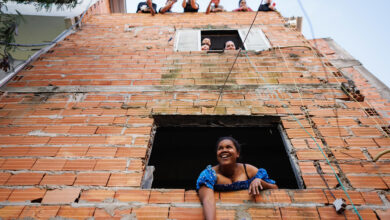Macri did not help overcome the crisis in Argentina, he deepened it
In the two and a half years of government, Argentina's public finances have not improved, on the contrary, the current government has worsened them

It is not a lie that after 12 years of Kirchnerism in Argentina, the current President Mauricio Macri received a State sunk in debt, and that taking it out of there would take a monumental effort. But far from rescuing the public finances of red, in Macri's time the crisis deepened. This new low point is the responsibility of the current government, whose responsibility transcends that of an adverse international climate.
Leer en español: Macri no cumplió: El mandatario profundizó la crisis en Argentina
Bad from the beginning
Whoever moved IGNORE INTO the Casa Rosada had to tie up his belt: reduce the fiscal and commercial deficit of the State and restore investor confidence to avoid having to reissue money and fall back IGNORE INTO the inflation trap. It was a difficult task, but it was what had to be done, they were the inescapable goals of the State to fulfill its people, who worried saw how their savings lost value.
However, Macri's proposals with which he reached the presidency in 2015 did not reflect this need. Although they intended to comply with the Argentine population, which was paying ridiculous taxes to compensate for the deficit that the government itself had generated with its excessive spending, Macri's most popular proposals implied a huge expenditure that would only accentuate that deficit.
The construction of 4,000 early childhood centers, an infrastructure plan of 25 billion dollars per year and the delivery of one million mortgages to 30 years without interest are proposals that ratify the commitment of the State to the needs of the population, but which were deeply irresponsible, considering that the Argentine state ended 2015 with a fiscal deficit of 45,803 million dollars and with 39.8% less money in the coffers of the Central Bank.
The "gradualism", the biggest mistake
This does not mean that Macri did not have plans to revitalize a depressed economy. Yes, he had plans, but they were going to be slow, a strategy that the incoming government called "gradualism". The gradualism has had serious problems, but the worst is that, in addition to slow, has been painful.
To compensate the continuity in spending, which remained at 41% of GDP, a figure that can easily be confused with that handled by the Kirchner government, Macri would seek to regain Argentina's access to international credit. But seeing that Argentina's recovery faltered, the credit did not reach the rate that Macri expected. His contingency plan, then, depended on increasing the collection.
The Wall Street Journal, in its article "Gradualism is Dead", reported that, in some cases, the electricity bill for businesses and families increased by up to 1000%, which had an impact on the employment rate, discouraged foreign investment and scared the entrepreneurs.
You may be interested: Argentina crisis: The strategy to end the fiscal deficit
In addition, by failing to create a favorable scenario for investment, the inflation targets, which in themselves were modest because they sought to maintain it at a still high 12% per year, could not be achieved. This forced Argentina to seek the help of the International Monetary Fund, and to seek to balance state accounts through more cuts to subsidies that kept the middle and lower class in the fight.
The "gradualism", then, failed because of its timidity, because of its lukewarmness. It was not aggressive enough in cutting public debt and controlling inflation to satisfy foreign investors, but it was not slow enough to save the Argentineans on foot.
A delayed response
Now, facing a more devastating scenario, which is compounded by a devaluation of the unprecedented Argentine peso that has lost 53% of its value so far this year, and an international economic climate given to the protectionism that hinders the re-entry of Argentina to International markets, Macri is forced to pull the hand brake and introduce more cuts to public spending that will be unpopular and traumatic.
A cut of 10 ministerial posts in the presidential cabinet, greater cuts to subsidies, which now represent only 0.5% of GDP and the application of greater retentions to all industries, are the changes that can be expected within the next few days.
Macri calls this new approach to the crisis "accelerated gradualism", a term built around a contradiction, which exposes the world to the failure of its first two and a half years of government. Macri did not solve the crisis, he deepened it.
Latin American Post | Editorial Team
Translated from "Macri no cumplió: A través de él se profundizó la crisis"





